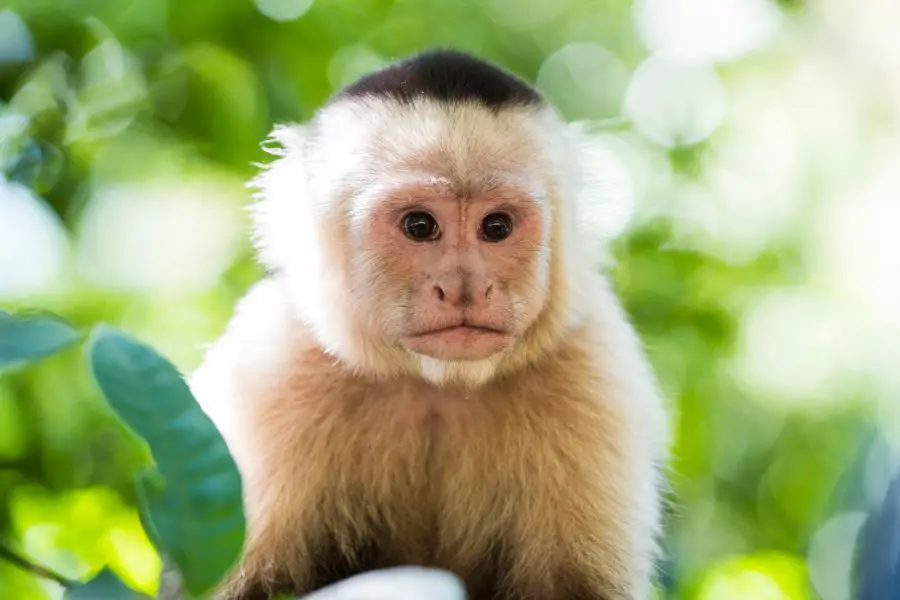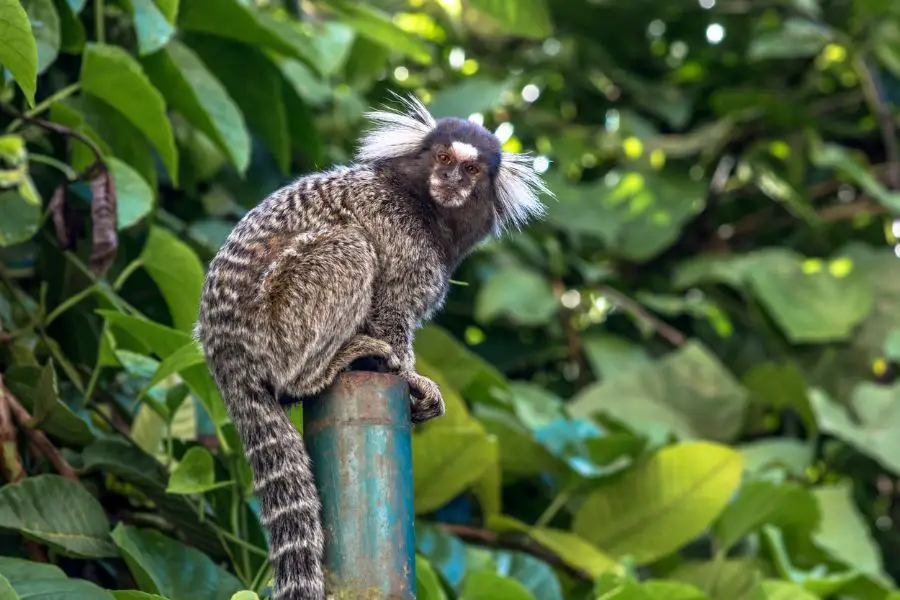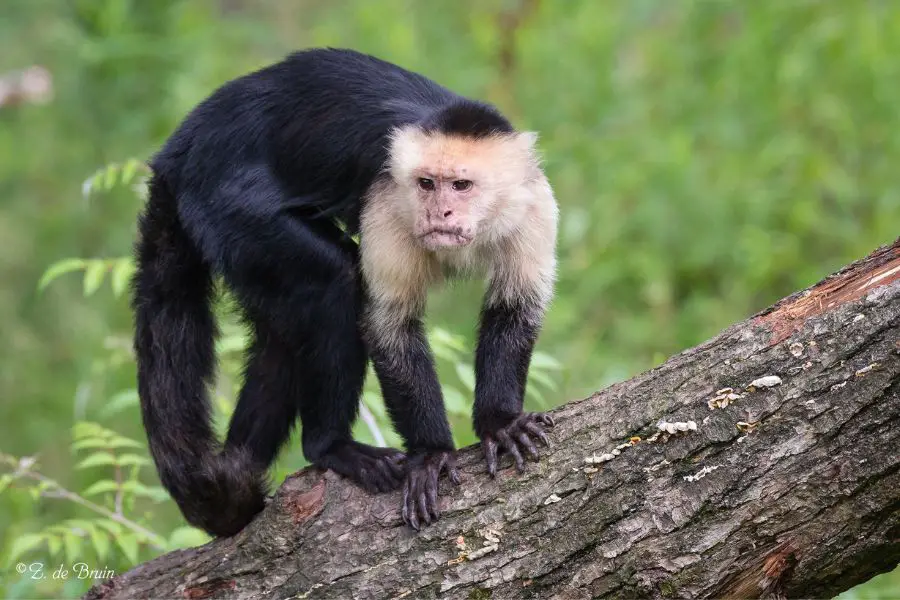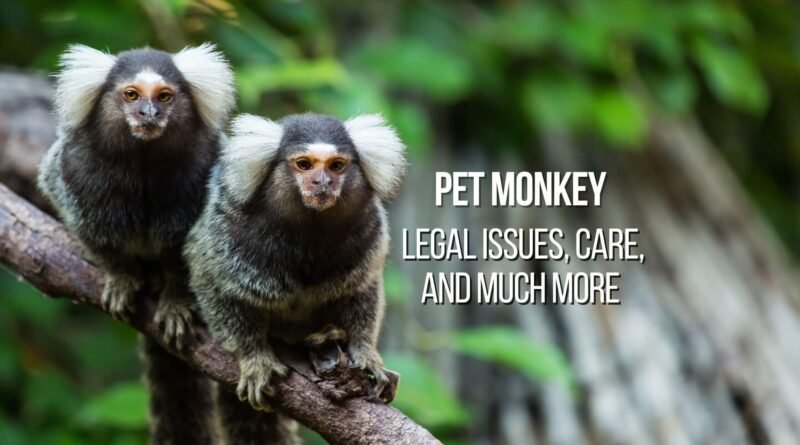Pet Monkey: Legal Issues, Care, and Much More
Wild animals should remain in their natural habitats, along with others of their species. In Brazil, for example, the Wildlife Protection Law considers the commercialization or breeding of wild animals without legal authorization from IBAMA (Brazilian Institute of Environment and Renewable Natural Resources) as an environmental crime. Nevertheless, perhaps you think or dream of having a monkey as your pet. Let’s talk a little about this! After all, can you have a pet monkey? What are the safety and well-being considerations? And the legal issues? In this article, we will try to clarify a bit about this. Enjoy reading and have fun!
Legal Issues for Having Domesticated Monkeys
Every primate is considered a wild animal, and, as with any exotic pet, the demands for their care are not small. The initial concern you should have when looking for a monkey to adopt is to ensure that you will not be committing an environmental crime by purchasing the animal from unlicensed and unauthorized businesses approved by the relevant authorities.
Wildlife smuggling is a serious and severe problem, and those who acquire animals without knowing their origin and without the proper legal documentation are contributing to wildlife trafficking. Be sure that you are dealing with places authorized by relevant authorities and the state environmental department.

Regulations and Licensing for Pet Monkeys: Navigating Varied Jurisdictions in the United States
The responsibility for granting licenses for the ownership of monkeys as pets can vary according to jurisdiction. In some cases, the competent authority may be the state’s wildlife or natural resources department. In others, it may be the agriculture, health department, or even a specific agency designated to regulate exotic or dangerous animals.
As laws and regulations differ from state to state in the United States, it is crucial to contact the appropriate local authority for specific information on obtaining a license to own a monkey. It may be necessary to fill out specific forms, meet facility requirements, and provide evidence of the ability to care for the animal properly.
Furthermore, in some jurisdictions, approval from zoos or specialized organizations may be required before a license is granted. Obtaining information directly from local authorities will ensure that those interested fully understand the requirements and responsibilities associated with owning monkeys as pets in their specific area.

Pet Monkeys: Is It a Good Idea?
When we decide to have a pet, we rarely think about how long this little animal will be with us. Our well-known domestic dogs and cats usually stay in our lives for around 10 to 15 years. In contrast, a capuchin monkey, for example, can live up to 30 years. Certainly, it is not a pleasant topic to address, but unfortunately, it is necessary: who will take care of the pet monkey if something happens to its owner? There are so many changes that can happen in our lives in 30 years—marriage, change of residence, family illness, countless issues.
A primate needs a long learning period with its mothers, sometimes extending for years, for them to develop their personality. When separated from their mother, in addition to the psychological trauma, there is also the fact that they will mimic the personality of their owner and the people they live with. However, the facial expressions of primates, even those living with humans, can have totally different meanings, leading to misunderstandings resulting in fights, injuries, and bites. Therefore, when wondering if it is possible to have a monkey as a pet, remember: yes, you can have a pet monkey, but should you?

Care that Pet Owners Should Take with Pet Monkeys
Keeping pet monkeys is not the same as having a puppy or a kitten. They require more than just a comfortable bed. In fact, they need an environment that closely resembles their wild nature. The enclosure should be spacious, with plenty of branches for them to jump around like they would in trees. Without adequate space for exercise, pet monkeys can become depressed and aggressive.
• Good Pets
While monkeys are often seen as cute and fascinating creatures, owning them as pets is not suitable for everyone. Primate ownership is a long-term commitment that comes with various challenges. Potential owners should be aware that monkeys require specialized care and attention throughout their entire lives.
• Wild Nature
Monkeys are primates, and their natural habitat is in the wild. It is important to remember that even when kept as pets, they still possess traits and instincts that are deeply rooted in their wild nature. This means that their behavior and needs can vary based on their species, such as macaque macaques or tamarin tamarins.
• Social Interactions
Primates, including monkeys, are highly social animals that thrive on social interactions. In the wild, they live in complex social structures, engaging in cooperative behaviors, playing, and communicating with other monkeys. Therefore, leaving them alone for extended periods can cause stress, anxiety, and other behavioral problems. It is crucial for their well-being to provide them with opportunities for socialization.
• Veterinarian
Just like any other pet, monkeys require regular veterinary care. It is important to find a veterinarian who specializes in primate health and welfare. They can provide guidance on diet, diseases, and other health concerns that may arise.
• Cute
While monkeys can be undeniably cute, it is essential to remember that they are not suitable pets for everyone. They are highly intelligent and can become aggressive, especially as they grow older. Additionally, some species of monkeys, such as chimpanzees, have the strength to cause serious harm. Owning a primate should not be based solely on their cuteness factor.
Capuchin Monkey and Marmoset Monkey
Just so you know, in Brazil, IBAMA (Brazilian Institute of the Environment and Renewable Natural Resources) authorizes the purchase and sale, in authorized breeding facilities, of animals born in captivity only for the capuchin monkey and the marmoset monkey. Let’s learn about the characteristics of each.

Marmoset
In South America, they are one of the most common primates, seen in various locations, including areas near human-populated nature such as parks and beaches with vegetation and mangroves. Their natural habitat is primary and secondary tropical forests, but due to deforestation, they have adapted to urban areas such as city gardens.
Marmosets are extremely intelligent and learn tricks very easily. In nature, they live in social groups of up to 15 individuals, have diurnal habits, and have an omnivorous diet, including fruits, eggs, small vertebrates, leaves, and flower nectar. They are very agile and fast. If they escape from where they live as pets, it will be difficult to capture them.
They are small animals, weighing no more than 9 ounces, measuring 7 to 12 inches, and can live up to 15 years in captivity. There are more than 20 different species of marmosets, belonging to the genus Saguinus, and the physical traits of each may differ slightly, but in summary, they are similar animals, both physically and behaviorally.

Capuchin Monkey
Currently, 14 species of capuchin monkeys are recognized, and in Brazil, the two most common are the white-fronted capuchin (Cebus albifrons) and the black-horned capuchin (Sapajus nigritus). Like all primates, all types of capuchin monkeys are highly social animals, living in groups of up to 20 individuals with complex forms of social interaction, including games and play, vocalizations with grunts and squeaks, and mutual grooming. All these forms of relationship and coexistence reinforce their bonds as a family that follows the hierarchy of the group.
The capuchin monkey (Cebus spp) is one of the most well-known monkeys in Latin America and one of the most studied. In these species of monkeys, there is sexual dimorphism, and females are slightly smaller than males, which can weigh up to 18 pounds and measure up to 20 inches. Diurnal in nature, they eat everything they find, from leaves and flowers to insects and lizards. Their habitat is tropical and subtropical forests, but they can also adapt to living in clearings and forest edges. If there are trees for shelter and food available, they can live in the area.
Some species of capuchin monkeys are endangered due to habitat loss from deforestation and also due to hunting for the illegal trade of wildlife. The Trinidad white-fronted capuchin (Cebus trinitatis) is classified as ‘critically endangered’ according to data assessed by the International Union for Conservation of Nature (IUCN) in 2021, with only 50 adult individuals. On the other hand, the Colombian white-throated capuchin (Cebus capucinus) is classified as ‘vulnerable,’ according to 2020 data. Unfortunately, only a few capuchin monkey species are still listed as ‘least concern.’

Conclusion
Our kittens and puppies were domesticated more than 10,000 years ago and make perfect companions. They adapt well to our environments and are cheerful and loyal to humans. Given this, we must question the need to have wild and exotic animals as pets. While it may be legal to have a pet monkey, we should consider if it is truly what we desire. More importantly, is it in the best interest of the little animal? Regardless of your answer, it’s crucial to remember that the illegal trade of animals is a major factor contributing to species extinction.
If you decide to have a pet monkey as your lifelong companion, it is necessary to adhere to all laws and care recommendations. This ensures a happy and healthy life together. However, it’s important to note that monkeys are not good pets for human beings, especially human children. They belong in the wild, and keeping them as pets can lead to behavioral problems and potential dangers.
Monkeys, including pet monkeys, are highly intelligent and social creatures that thrive in large groups. They require a secure enclosure and a diverse diet. Some monkeys, like macaques and tamarins, also have sharp teeth and may not be effectively toilet trained. Monkeys should not be kept as pets, especially smaller monkeys like capuchins.
Owning a pet monkey is a full commitment that requires extensive knowledge and resources. It is time-consuming and can lead to primates suffering from behavioral issues. Additionally, owning a monkey can pose risks to humans, such as bites and zoonotic diseases. It is crucial to have a veterinarian experienced with primates and to follow strict hygiene protocols when handling feces.
Certain types of monkeys are illegal to own in certain states and countries. It is important to research and understand the laws and regulations in your area before considering a monkey as a pet. Even with proper care, monkeys may still exhibit aggressive behavior and can cause harm.
Monkeys have expressive eyes and are fascinating creatures, but they belong in their own kind and in their natural habitat. It is our responsibility to protect and preserve their space in the wild. Instead of owning monkeys as pets, it is better to support conservation efforts and appreciate them from a distance.
Until next time! ♥



